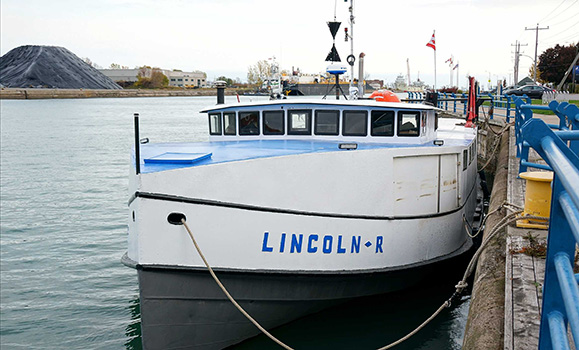The challenges faced by those in Canada’s commercial fishing industry can seem endless: harsh weather, climate change, invasive species, changing government regulations, fluctuating catch prices, an aging workforce, and, in the case of Indigenous fishers, racism and violence.
So what drives people to make their living on board a fishing boat?
It’s a question Dr. Hannah Harrison, a social scientist and assistant professor in Dal’s Marine Affairs Program, set out to explore. Raised in a commercial salmon fishing family in Alaska, Dr. Harrison already had personal and research connections to the industry, but a postdoctoral fellowship at the University of Guelph piqued her interest in the Great Lakes region commercial fisheries, North America’s largest freshwater commercial fishing fleet.
“I began to wonder why commercial fisheries in Ontario are not a bigger part of the province’s culture and life,” she says, referencing the pride she noticed Ontario has for its farming and agricultural industries.
I feel a very strong obligation to produce outputs from my research that are accessible to the communities I work with
In a project that started five years ago during her postdoc and continued after her arrival at Dal in 2022, Dr. Harrison rode along on fishing boats and conducted dozens of interviews with commercial fish harvesters (a catch-all term for those in the industry, from fishers to processing plant workers) in Ontario‚Äôs Great Lakes region and the Saugeen Ojibway Nation.Ã˝
Rather than only presenting her findings in research papers, which are largely confined to academia, Dr. Harrison pairs publishing with making films and podcasts. ‚ÄúI feel a very strong obligation to produce outputs from my research that are accessible to the communities I work with,‚Äù she says.Ã˝
The greying of the fleet
Her exploration of life in the industry is captured in an hour-long documentary, Last Boat on the Lake, released last month and (or below). A labour of love to make — Dr. Harrison researched, filmed, narrated, and produced the documentary, with editing by Donald Selby — she says the positive feedback received following early screenings has made it all worth it.
“The sign of really impactful work is not because it translated to a publication with citations, but because the people who watch it feel their stories being represented in an authentic and meaningful way.”
Her film may be finished, but Dr. Harrison‚Äôs exploration of the industry will continue thanks to a four-year, $406,000 grant from the .Ã˝
A key finding from making the film was a lack of new entrants to the industry, resulting in a ‚Äúgreying of the fleet,‚Äù a problem Dr. Harrison notes is faced by both Indigenous and settler fish harvesters who took part in the film. The grant will fully fund a Dal Interdisciplinary PhD student to study barriers to entry for new/young entrants to Great Lakes commercial fisheries.Ã˝
Dr. Wilf Swartz of the Marine Affairs Program is a collaborator on the project, along with Dr. Kristen Lowitt of Queen’s University and biologist Ryan Lauzon who works with the Saugeen Ojibway Nation.
While diving into the challenges faced by the commercial fisheries, Dr. Harrison says she was struck by the prevailing notion of hope expressed by fish harvesters in her study.
Join the study
Interested candidates can . Applications are due by March 31, 2025.
‚ÄúPretty much everyone had a sense of love for the industry and for this job as a livelihood, even if they felt the future didn‚Äôt always look bright,‚Äù she says. ‚ÄúTo me, that was really inspiring.‚Äù¬Ý
Last Boat on the Lake¬Ýwas produced in partnership with the Saugeen Ojibway Nation. Funding was provided by the¬Ý, , the , the , and the Marine Affairs Program.

Dr. Harrison’s research project explores life in North America’s changing commercial fisheries.

